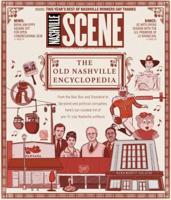
Greg Bryant and Paul Horton
Many exciting, intriguing musical elements converge in the work of Music City duo Concurrence, which consists of keyboardist Paul Horton and bassist Greg Bryant. One of those elements is clearly the legacy of jazz. But when asked how they characterize what they do, both are crystal clear on one thing: Don’t call them a jazz band.
“It’s not that we have anything against that word,” Bryant tells the Scene. “Both of us are huge fans of all kinds of music, and we have our jazz heroes. But for what we’re trying to do and the audience we’re trying to reach, if you call us a jazz band, it gets into certain types of expectations. We’re not going to be doing the types of tunes that necessarily fit that formula — at least not the stereotype people have about how jazz should sound.”
“We definitely work off a foundation of improvisation,” Horton chimes in. “But we prefer to call what we do ‘creative music’ or ‘black creative music.’ Duke Ellington wasn’t fond of the word ‘jazz’ either. Nor was Miles Davis. One of the things we’ve discovered when people come to hear us, especially young people, is they say: ‘Wow, that’s not what we were expecting!’ We’re trying to expand the audience for improvisational music. Plus, both of us come from a background of enjoying all types of music and incorporating multiple influences into our sound.”
Certainly Concurrence’s past concerts at places like Exit/In or Rudy’s Jazz Room reflect the idiomatic diversity Horton identifies. It’s also apparent in their appearances as part of Nashmatikz, a recurring hip-hop event at Rudy’s with a rotating cast — Thursday’s Nashmatikz will also include rappers Rashad tha Poet and James Fate, along with DJ Colonel Austin and a crew of b-boy dancers. And you can hear an array of styles in Horton and Bryant’s new seven-song EP Concurrence!, which they’ve self-released on Bandcamp. (Concurrence has become a staple at Rudy’s, and they’ll be back to play Friday night as well.)
Both the group’s name and its approach spotlight the personal and professional closeness between Bryant — who has a range of experience as a record producer, DJ and concert promoter — and Horton, who has toured extensively with Alabama Shakes.
“Eighty-five percent of what we do in terms of composition comes from Paul — he’s the musical director,” says Bryant. “But there’s lots of times where I might have an idea, or I’ll start with a melodic fragment, and Paul will say, ‘Let’s work off that.’ We’ve always had a symmetry and a friendship that comes across in the music. What we want to do is bring to audiences, through our music, a sense of brotherhood and community, with songs that have energy and rhythmic intensity, but give us room to stretch out as players.”
Concurrence! covers those bases admirably. Some tracks were cut live at Rudy’s, others were recorded in the studio of Nashville musician and engineer Jon Estes (who’s worked with Steelism and Robyn Hitchcock, among others, and who co-produced Concurrence!), and others still were recorded at home by Horton. Throughout, Horton alternates between piano, electric keyboards and sampler; Bryant is a lively but consistent presence on acoustic and electric basses; and Bammie Davis Jr. provides agile drumming on the live tracks, shifting his approach from contemplative to athletic. There’s quite a bit going on, but it feels cohesive.
“There’s a lot of options we enjoy exploring in our music,” says Horton. “I think that’s what makes it work, and that’s why I think our audiences have responded in the manner they have across the board.”
Some songs on the record are short workouts that showcase the interaction between the players, like a quiet conversation. “Think Back,” “Still Going” and “Endgame” are the three longest tracks, with many ambitious passages in their multiple twists and turns. But none unfold or evolve in a manner you’d associate with any particular jazz tradition, nor are they designed as solo showcases for any particular player. Even so, they all uphold the jazz canon in terms of technical expertise, melodic development and rhythmic variety.
“What we’ve discovered through the years is audiences are more knowledgeable and open than they are given credit for in many instances,” Bryant says. “The biggest problem with improvisational music is folks have too often been told what they should and shouldn’t be hearing. We’re not interested in doing that.”





